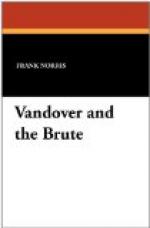In ten minutes he was back at his easel again. His charcoal wandered, tracing empty lines on his canvas, the strange numbness grew again in his head. All the objects in the range of his eyes seemed to move back and stand on the same plane. He became a little dizzy.
“It’s the tobacco,” he exclaimed. “That pipe always was too strong.” He turned away to the open window, feeling an irresistible need of distraction, of amusement, and he remained there resting on his elbows, listening and looking, trying to be interested.
It was toward the middle of the afternoon. The morning mist was long since evaporated and the first faint puffs of the inevitable trade wind were just stirring the leaves of the eucalyptus across the street. In the music-room of the white house the young lady of the family had opened the piano and was practising finger-exercises. The scales and arpeggios following one another without interruption, came to his ears in a pleasant monotone. A Chinese “boy” in a stiff blouse of white linen, made a great splashing as he washed down the front steps with a bucket of water and the garden hose. Grocery and delivery wagons came and went, rattling over the cobbles and car-tracks, while occasionally a whistle blew very far off. At the corner of the street by a livery-stable a little boy in a flat-topped leather cap was calling incessantly for some unseen dog, whistling and slapping his knees. An ex press-wagon stopped a few doors below the white house and the driver pulled down the back-board with a strident rattle of chains; the cable in its slot kept up an unceasing burr and clack while the cars themselves trundled up and down the street, starting and stopping with a jangling of bells, the jostled glass windows whirring in a prolonged vibrant note. All these sounds played lightly over the steady muffled roar that seemed to come from all quarters at once; it was that deep murmur, that great minor diapason that always disengages itself from vast bodies, from mountains, from oceans, from forests, from sleeping armies.
The desire for movement, for diversion, for anything that would keep him from thinking was not to be resisted. Vandover caught up his hat and fled from the room, not daring to look again at the easel. Once outside, he began to walk, anywhere, straight before him, going on with great strides, his head in the air.
He found Charlie Geary and took him to supper. Vandover talked continually on all sorts of subjects, speaking very rapidly. In the evening he insisted on Geary going to the theatre with him. He paid the closest attention to the play, letting it occupy his mind entirely. When the play was over and the two were about to say good night, Vandover began to urge Geary to sleep up at his rooms that night. He overrode his objections, interrupting him, taking hold of his arm, and starting off. But Geary, a little surprised at his manner, refused. There were certain law papers he had taken home with him




